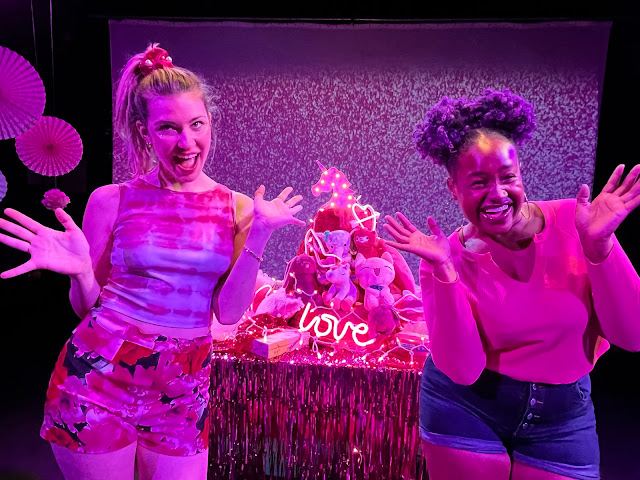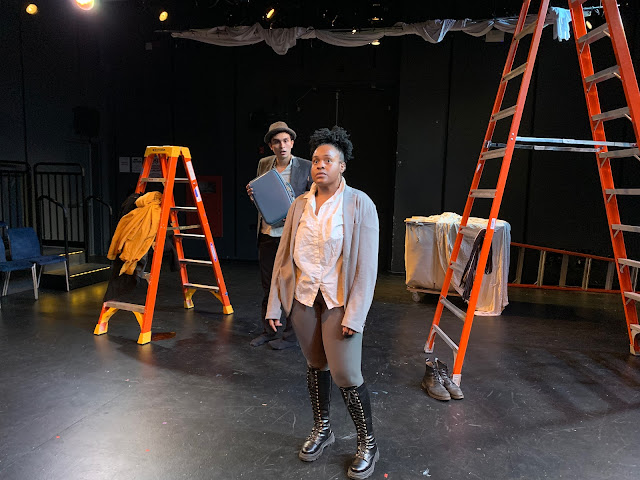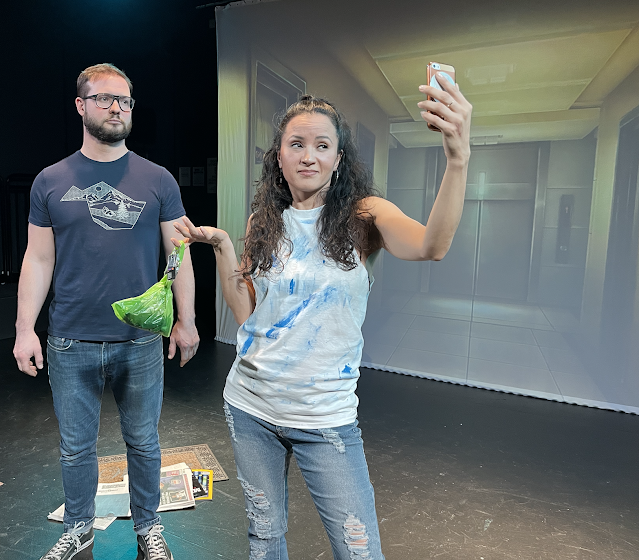Hybrid Two-Handers written by Eliza Bent, Kaaron Briscoe, Georgina Escobar, Amina Henry, and Erin Mallon
Monologues written by Suzanne Bradbeer, Rachael Carnes, Alexis Craig-Hart, Catalina Florescu, Julienne Hairston, Judith Leora, Francesca Pazniokas, Sally Seitz, and Lia Romeo
Directed by Michole Biancosino and Andrew W. Smith
Presented by Project Y Theatre Company via weekly pass for streaming on-demand
February 4-March 18, 2022
 |
| Natalie Nankervis and Starr Kirkland in #GirlPowerHour. Photo by Julianna Austin |
As part of the seventh installment of the annual Women in Theatre Festival (WIT), in which more than half of all the artists involved are women and which produces new work by women, Project Y Theatre Company commissioned five women playwrights to create short works "that invite in an audience of simultaneously streaming and in-person audiences" and require only two actors. Sadly, the omicron wave forced the abandonment of the in-person portion of the hybrid experience. Happily for theater fans, however, Project Y was able to perform and record the Hybrid Two-Handers at A.R.T./New York Theatres without an audience and has now made them available for streaming alongside WIT's 2022 Monologue Slam, which features eleven monologues written by nine different women playwrights. Viewers can purchase a Streaming Pass for the week they want to begin watching the festival and will receive access to all five of the Hybrid 2-Handers and the Monologue Slam.
Interestingly, whether by design or coincidence, the concept of performance forms one throughline among the Two-Handers, from the theater to streaming to IG Live to piano to a different kind of memorial service. Opening the program of short plays,
Blackbox, by Amina Henry, focuses on a pair of stage actors (Starr Kirkland and Timiki Salinas), who have broken into a pandemic-shuttered theater space, in order to consider, in the context of having lost the outlet of live performance, what it is like to experience something by acting it for an audience; to create illusions using primarily one's body; and, fundamentally, to play–as well as to ask whether playing is enough. The interplay throughout
Blackbox between Salinas's unflaggingly enthusiastic actor and the mingled joy and doubt of Kirkland's proves a very effective dynamic. The characters in Kaaron Briscoe's standout
#GirlPowerHour are also habituated to performing for audiences. Their titular online show, though, takes place in the context of a patriarchal dystopia—although to be fair, some elements are not that far removed from our own patriarchal dystopia, as highlighted, for example, by hosts Kara (Starr Kirkland) and Christy's (Natalie Nankervis) talk of Name Givers or the commodification of "girl power" by corporate conglomerates like the one that sponsors their show. It is perhaps that sponsor that monitors the show to ensure that it stays on pink-drenched, bubbly, upbeat message, like a pre-verbal, feral version of the offstage Voice in Beckett's
What Where. Nevertheless, Kara begins to have some trouble staying in the approved lane. What follows evolves via a pair of excellent performances by Kirkland and Nankervis and culminates in memorably resonant imagery.
 |
| Starr Kirkland and Timiki Salinas in Blackbox. Photo by Julianna Austin |
The tension in the bittersweet
Middle C, by Erin Mallon, comes less from any immediate external circumstance and more from Erin DeWard's rough-edged authenticity as a piano teacher who is meeting her student of ten years, Cassidy (Emily Ma), before she leaves for college that day. Cassidy will receive a surprise, and we will find out more about what Cassidy means to her instructor in the context of the latter's present and past.
Middle C also touches on some similar themes as the previous two plays, such as what happens when a woman doesn't meet expectations, especially when that woman is "not a people person," and the ways in which art can be a means of organizing and making sense of life. From the leave-taking of
Middle C, Georgina Escobar's
Rigged pivots to a charmingly unusual meet-cute between a white man, Gabriel (Joachim Boyle), and his artistic Latinx neighbor, Colombia (Yadira De La Riva), in their NYC apartment building. Colombia is streaming to Instagram, and Gabriel has been performing (he uses the word confessing at one point) to the super's security camera; but will they find more in common?
In Service of Memory, by Eliza Bent, closes things out in fantastic fashion, as two facilitators (Natalie Nankervis and Joachim Boyle) lead a memorial service, but not the kind that you are expecting. Lead might be an overstatement, though, as the pair are continually and delightfully sidetracked, spinning a fast-paced bricolage of wordplay, quotation, allusion, and association. Much of their exchange of course has to do with contents and workings of memory, making it all the more ironic that it keeps causing them to forget what they should be concentrating on.
 |
Joachim Boyle and Yadira De La Riva in Rigged. Photo by Julianna Austin
|
The Monologue Slam offers a dynamic complement to the Two-Handers, and it's always impressive how much character and context can be evoked in such brief pieces. Two strong pieces bookend the Slam: Judith Leora's terrific "Real American Girl," performed by Chantelle Guido as a stylist whose haircut on a doll leads to bigger questions, gets things off to a great start and echoes the themes of gender expectations in
#GirlPowerHour and
Middle C; and Starr Kirkland brings the slam to a vigorous close with "I Am an Island," by Julienne Hairston, which uses its titular metaphor as a springboard to contemplate, "But what kind?" "The Monument Maker," written by Sally Seitz and performed by Wynn McClenahan, similarly explores self-construction, but through vivid dream imagery. Other highlights include Lia Romeo's "Mark," performed by Timiki Salinas, which traces the unexpected curves of the arc of grief; "Sitting and Talking," another Romeo monologue, performed with nuance by Gibson Grimm, which addresses the difficulties of caring and of acting on that care; and "Elijah," by Judith Leora, performed by Julianna Austin as a daughter whose reminiscences have as powerful an impact on the audience as they do on her.
With its Hybrid Two-Handers and Monologue Slam, the 7th Annual Women in Theatre Festival provides a platform for a range of women's voices, perspectives, tones, and approaches that together also form suggestive interconnections. Any theater fan will find much to enjoy in this collection of short works.
-John R. Ziegler and Leah Richards






Comments
Post a Comment